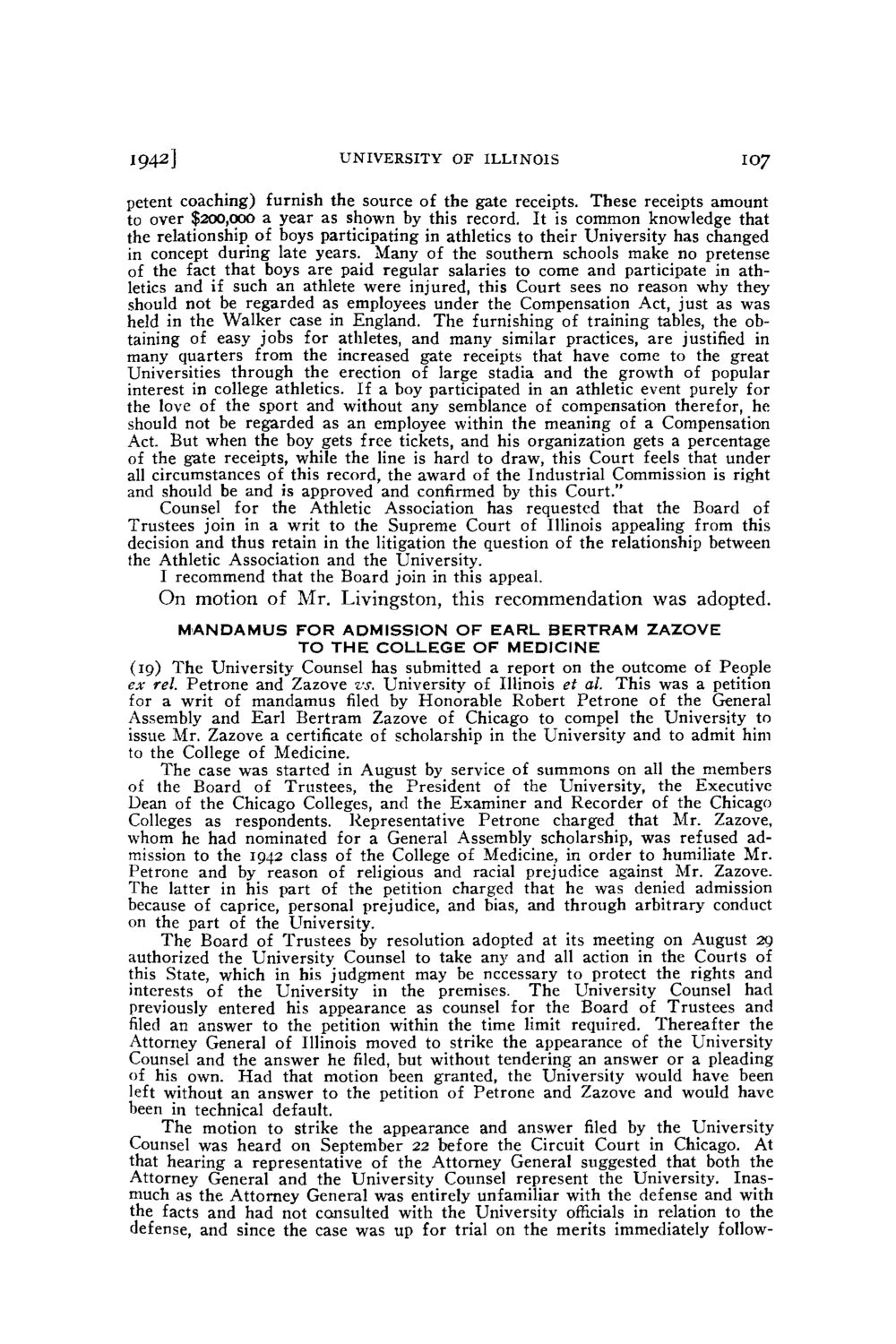| |
| |
Caption: Board of Trustees Minutes - 1944
This is a reduced-resolution page image for fast online browsing.

EXTRACTED TEXT FROM PAGE:
1942] U N I V E R S I T Y OF I L L I N O I S IO7 petent coaching) furnish the source of the gate receipts. These receipts amount to over $200,000 a year as shown by this record. It is common knowledge that the relationship of boys participating in athletics to their University has changed in concept during late years. Many of the southern schools make no pretense of the fact that boys are paid regular salaries to come and participate in athletics and if such an athlete were injured, this Court sees no reason why they should not be regarded as employees under the Compensation Act, just as was held in the Walker case in England. The furnishing of training tables, the obtaining of easy jobs for athletes, and many similar practices, are justified in many quarters from the increased gate receipts that have come to the great Universities through the erection of large stadia and the growth of popular interest in college athletics. If a boy participated in an athletic event purely for the love of the sport and without any semblance of compensation therefor, he should not be regarded as an employee within the meaning of a Compensation Act. But when the boy gets free tickets, and his organization gets a percentage of the gate receipts, while the line is hard to draw, this Court feels that under all circumstances of this record, the award of the Industrial Commission is right and should be and is approved and confirmed by this Court." Counsel for the Athletic Association has requested that the Board of Trustees join in a writ to the Supreme Court of Illinois appealing from this decision and thus retain in the litigation the question of the relationship between the Athletic Association and the University. I recommend that the Board join in this appeal. O n m o t i o n of M r . L i v i n g s t o n , this r e c o m m e n d a t i o n w a s adopted. MANDAMUS FOR ADMISSION OF EARL BERTRAM ZAZOVE TO THE COLLEGE OF MEDICINE (19) T h e University Counsel has submitted a report on the outcome of People ex rel. Petrone and Zazove vs. University of Illinois et al. This was a petition for a writ of mandamus filed by Honorable Robert Petrone of the General Assembly and Earl Bertram Zazove of Chicago to compel the University to issue Mr. Zazove a certificate of scholarship in the University and to admit him to the College of Medicine. The case was started in August by service of summons on all the members of the Board of Trustees, the President of the University, the Executive Dean of the Chicago Colleges, and the Examiner and Recorder of the Chicago Colleges as respondents. Representative Petrone charged that Mr. Zazove, whom he had nominated for a General Assembly scholarship, was refused admission to the 1942 class of the College of Medicine, in order to humiliate Mr. Petrone and by reason of religious and racial prejudice against Mr. Zazove. The latter in his part of the petition charged that he was denied admission because of caprice, personal prejudice, and bias, and through arbitrary conduct on the part of the University. The Board of Trustees by resolution adopted at its meeting on August 29 authorized the University Counsel to take any and all action in the Courts of this State, which in his judgment may be necessary to protect the rights and interests of the University in the premises. T h e University Counsel had previously entered his appearance as counsel for the Board of Trustees and filed an answer to the petition within the time limit required. Thereafter the Attorney General of Illinois moved to strike the appearance of the University Counsel and the answer he filed, but without tendering an answer or a pleading of his own. H a d that motion been granted, the University would have been left without an answer to the petition of Petrone and Zazove and would have been in technical default. The motion to strike the appearance and answer filed by the University Counsel was heard on September 22 before the Circuit Court in Chicago. At that hearing a representative of the Attorney General suggested that both the Attorney General and the University Counsel represent the University. Inasmuch as the Attorney General was entirely unfamiliar with the defense and with the facts and had not consulted with the University officials in relation to the defense, and since the case was up for trial on the merits immediately follow-
| |